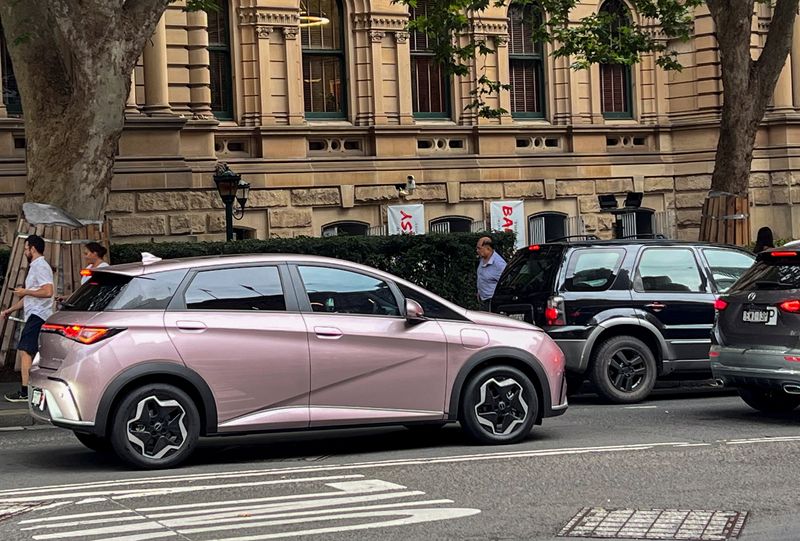By Stella Qiu
SYDNEY (Reuters) -BYD and other Chinese automakers are bringing new electric car models in droves to Australia, a market where they haven't faced trade barriers and sales have surged due to EV subsidies and tax benefits as well as high gasoline prices.
Since coming to power in 2022, Prime Minister Anthony Albanese's government has aggressively promoted EV adoption as part of the country's plans to cut down on emissions - a change that came after a decade of weak climate action under conservative leaders.
That's created a powerful tailwind for electric car demand. EVs accounted for 7.2% of Australian new car sales in 2023, up from 3.1% a year earlier.
While Tesla (NASDAQ:TSLA) too is greatly benefiting, it is the Chinese manufacturers in the non-premium end of the market which pose the biggest threat to incumbent automakers like Toyota (NYSE:TM) and Ford (NYSE:F) whose wide line-ups of gasoline-engine cars mean they have more to lose.
Last year, sales for EV giant BYD (SZ:002594), which entered the market in 2022, climbed nearly six times to more than 12,000 vehicles. The Warren Buffett-backed automaker now has 14% of Australia's EV market, second to Tesla which has 53%, data from the Federal Chamber of Automotive Industries shows.
"The opportunity is very clear," said David Smitherman, chief executive at EVDirect, BYD's distributor in Australia.
"We need to now get into the mainstream market because we've sold to the early adopters and the passionate EV purchasers."
BYD will add two SUVs and a pickup truck to take its product line-up in Australia to six this year, Smitherman said. EVDirect will also open 30 more dealerships in the next 18 months for total of a 55 and has embarked on fleet sales to companies like Uber (NYSE:UBER).
Chinese state-owned SAIC Motor will launch three new models this year under its MG brand, including the MG3 plug-in hybrid and MG Cyberstar electric roadster, taking its EV/hybrid product line-up in Australia to five.
Incumbent automakers are also looking to up their game. Ford has two electrified vehicles in the Australian market and another three on their way, according to a company spokesperson.
Toyota has just launched its first electric car, which joins its nine hybrids in Australia in offering lower emissions than comparable gasoline-engine vehicles. It is confident in its strategy of providing a wide range of hybrids and steadily increasing battery electric cars, it said.
'GIVING IT A GO'
Although Australia is a relatively small market on a global scale with 1.2 million cars sold last year, it's highly attractive to Chinese automakers given that it doesn't have a car manufacturing industry and is seen as unlikely to introduce protectionist trade barriers.
Chinese startup Leapmotor (HK:9863), which has partnered with Stellantis (NYSE:STLA) to expand globally, has designated Australia as a priority market noting its lack of local car makers.
In key markets, tensions abound. European authorities have launched a probe into whether Chinese EV makers unfairly benefit from state subsidies, while the U.S. has launched an investigation into whether Chinese-made cars could be used to spy on Americans.
But relations between Canberra and Beijing have warmed after years of tensions, with both sides agreeing to turn the page and expand cooperation. Albanese's government has not given any sign it is worried about cybersecurity risks posed by Chinese cars.
Australia's Department of Foreign Affairs and Trade declined to comment on the matter.
To spur electric car demand, the government has introduced tax exemptions for EV car leasing/purchase agreements available to some consumers through their employers.
The country's three most populous biggest states - home to Sydney, Melbourne and Brisbane - have also set goals for EVs to account for 50% of all new car sales by 2030, giving generous rebates on EV purchases and investing heavily to build charging stations.
That was a major motivating factor for Mark Adamson, a 61-year-old TV director in the state of Queensland. He gained A$6,000 ($3,900) off the A$54,000 retail price of his extended range BYD Atto 3 SUV through state government rebates and then BYD offered a discount of roughly A$2,000.
"I figured why not give it a go? It's sort of really worth doing and I have excess solar at home so I'll mainly charge from at home, so it makes it a no-brainer in a lot of ways," he said.
Indeed in Queensland, state government rebates alone mean that an Atto 3 can cost less than Toyota's gasoline-engine RAV4 crossover - a comparable model.
For Sydney union organiser Peter Alley, 63, who drives out once a week to see family who live 370 km (230 miles) away, it was the need to cut down on gasoline costs near record highs that persuaded him to switch from a 2008 Volkswagen (ETR:VOWG_p) diesel van to an Atto 3.
He now spends about A$20 per week on charging instead of $130 a week on fuel.

Expectations are high that EV demand will continue to surge, although forecasts vary. PwC estimates half of Australia's new car sales will be EVs by 2027. Fitch Ratings predicts 18% by 2032.
($1 = 1.5333 Australian dollars)